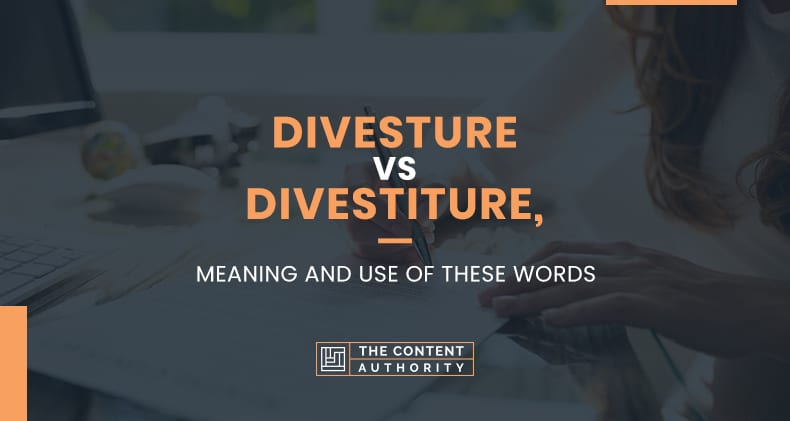In finance and economics, we are accustomed to hearing words like investment, stock, and leverage, but today, we will be exploring another word that though it rarely gets any spotlight, is still an essential vocabulary in the financial realm.
We can all grasp what the concept of investment is. That is the act of issuing money or resources to generate profit via the increase in value or appreciation of the original investment.
Divestiture is to strip someone of possessions, rights or relieving something of a certain quality. But, in the economic context, this verb means to be the opposite of investing. We use the word to connote our disintegration from an investment. Divesture meant the same before it became obsolete.
The definition of divestiture is the action of partially or fully liquidating unwanted assets through an exchange, sale, or even bankruptcy. This comes as the consequence of a management decision to close operations on a business unit under many different circumstances, such as a merger and the acquisition of other assets that would motivate the termination of a less profitable business venture.
The word originated from the Old French language around the 1560s as ”desvestir”, which meant to “strip of possessions,” but people commonly used it to refer to the stripping of clothes, equipment, and arms. By the 1670’s it was already being used to describe the stripping of possessions by legal process. It did not amass its financial connotation until the 1960’s when it started meaning the sale of a subsidiary asset and, funny enough, another kind of investment.

When Does Divestiture Take Place?
A business entity could determine they can no longer compete in a particular market and choose to dissolve their involvement in it. This could happen if a company’s attention is spread throughout multiple markets, and it would be potentially more profitable to concentrate on fewer enterprises. An accompanying example would be a stronger and more focused competitor entering the market and having a single focal point, thus capitalizing on other contenders’ overexpansion and effectively taking over.
Divestiture is not only done for companies to be able to concentrate on core businesses, but it allows them to repay their debts, increase shareholder value, and cut costs that would otherwise place them on the other side of a profitable endeavor. Suppose a company is facing financial difficulties or predicts it cannot compete during a significant period. In that case, it can opt to divestiture assets and use the revenue from the sale to develop other internal and productive departments. They are also called strategic realignments.
You can see how divesting would be a common practice for many conglomerates. Conglomerates are large corporations made of numerous businesses, very often unrelated to each other. In a conglomerate, a larger company has a controlling stake in several companies. It is, therefore, profiting from them but still allowing them to operate independently and separate from one another.
They are also called parent companies. An excellent example of one would be Koch Industries, a large multinational corporation that oversees many different subsidiaries. They are involved in energy, fibers, chemicals, petroleum, minerals, and finance, to name a few. You can notice that these business ventures are pretty contrasting, and, as a result, the focus on these undertakings must be spread out proportionally and simultaneously.
When Is It Appropriate To Divest Interests?
In many cases, divesting interests is the only option available to avoid filing bankruptcy and staying afloat, not only due to the immediate need to raise money, but a company may be obliged to facilitate a merger with a stronger company. In addition to companies and large corporations, governments may also choose to dissolve their involvement in particular interests to benefit the private sector.
A government can also employ divestiture to command a private sector industry to dispose of some of its interests in order to advance healthy competition in the industry and its demands. These are called regulatory divestments, and they happen when enterprises in the private sector start to monopolize their markets.
The Indian government, for instance, has put on track a long-term plan to divest state-owned assets in the aviation industry in an attempt to privatize them by selling their entire stake in a national airline carrier. Henceforth, this would promote more jobs in the private sector and allow the company to enter the stock market. They are expecting an Initial Price Offering or IPO to come to fruition within this year.
It is no surprise that divesting some assets can also increase current shareholder value, as liquidating resources can improve a company’s solvency and cash flow. This concept relies heavily on the premise that the break-off value or the sum of the individual parts is worth more than the value the assets have as a whole. It is much like having an expensive car but getting more money out of a sale by selling its parts separately and to the highest bidder.
Divesting is also a common practice for companies to employ when the markets turn volatile due to a rise in the price of startups or they undergo unstable conditions.

Is Divesture A Proper Conjugation?
You have probably noticed by now that we have barely touched on the word divesture, choosing to divest, divestiture, and disinvest instead. This is because divesture has become an obsolete conjugation of the noun. It is no longer used to describe an institution selling a subsidiary or a product line. In actuality, it is not a word you can use in a sentence.
Divestiture is the most formal version of the noun, and it provides the context of why the asset is being discarded, being a court-sealed government order. On the other hand, ”divesting” is mainly within the context of business.
What Are The Most Common Divesting Trends?
Before the 2008 financial crisis, most divestitures came as part of good corporate governance. Nevertheless, after the crisis, the dominant trend behind divestments has come as both regulatory requirements directly from the government or as a way to alleviate the problem by escalating their financial austerity.
More recently, activism has also promoted divestiture from what can be looked at as morally ambiguous business ventures. For example, some students are lobbying for their universities to withdraw their investments in alcohol, firearms, or tobacco enterprises. Even more drastically, some groups protest for the mass divestment of fossil-fuel companies such as ExxonMobil, and some celebrities have given their support for these initiatives.
Now, we cannot deny that divesting subsidiaries or product lines can signify the liquidation of employees, and entire workforces could be perceived as morally reprehensive. However, divesting is a way to improve companies by encouraging more focused business models, realigning capital for growth, merging interests, and improving the overall solvency of an enterprise.
Final Thoughts
You can conjugate the noun in many ways, and while it is the opposite of investing, it also means to reinvest. It allows companies to evaluate themselves and make the changes necessary to stay profitable and continue to provide the products they are in the markets for while keeping an eye out for the competition.
Whether it is a conglomerate looking to shrink its reach or just a tiny little company looking to stay above water, divesting is a needed tool in the business world.
It is a business strategy used to prolong the life of a company, or it can be used by the government to intervene in the private sector for the sake of balance and fairness. Regardless, it is done for the greater good; it is never just done on a whim, and, more importantly, it cannot happen without clear justification.
Shawn Manaher is the founder and CEO of The Content Authority. He’s one part content manager, one part writing ninja organizer, and two parts leader of top content creators. You don’t even want to know what he calls pancakes.

